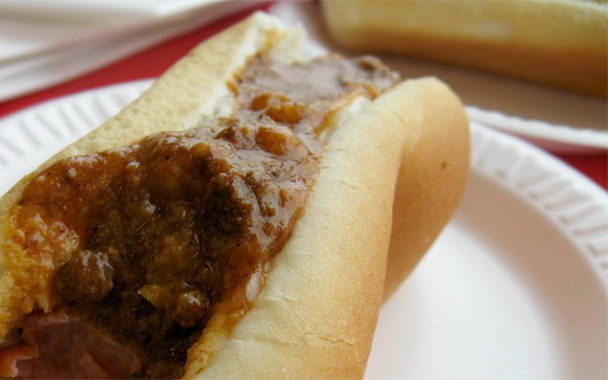It’s easy to make fun of New Jersey. I know. I grew up there and had to defend it daily from “Armpit of America” jokes when I went to school in Michigan. Then I moved to New York and had to defend it every Friday and Saturday night when legions of my people would bridge-and-tunnel their way to Manhattan in heels too high and muscle tees too tight. To be honest, it’s been years and my zeal has been sapped. I rarely go back, and I avoid Manhattan on weekend nights.
But, happily, I reacquainted myself last week with a magnificent Jersey institution: the ironically named Texas weiner joint.
Johnny and Hanges was sort of impossible to miss: an obviously recommissioned Chinese restaurant with a jade green shingled roof and pictures of enormous Texas weiners in the window. Immediately overcome with memories of hot dogs covered in chili sauce, mustard, and onions, I slammed on the brakes and swung into the driveway in my brother’s tricked-out white sports car. (He goes back to Jersey a lot more than I do.)
At the counter, I got two dogs “all the way” (aka with everything) and an order of mozzarella sticks, despite the fact that their claim of being “New on the menu” was impossible to believe. To be fair, Johnny and Hanges has been around since 1939, so maybe something that was ubiquitous in the Frialators of America in 1985 still counts as being new.
As Christine and I ate, we looked around the room, a gentle portrait of suburbia: a table of shaggy-haired teenagers, older couples, a father feeding his young daughter while the two watched golf on TV.
The dogs were fantastic, and one bite in I already regretted not ordering more. The chili was complex with spices; the dog was evenly browned, deep-fried until snappy with an enchanting earthiness, which also describes the woman behind the counter. “Hey, whaddya two lovebirds waunnt?” she called to us when we went back up.
We ordered two cannoli to go, but then the proximity to the dog fryer suddenly made me blurt, “Your hot dogs are so good.”
“Thank you,” the woman said softly and graciously. She told me they were from Thumann’s, but custom made according to an original recipe. She handed us the cannoli and thanked us sincerely for coming.
Partway to the car, we decided to stay and eat at the patio tables, mainly because if they were going to take the trouble to fill the cannoli to order, their trouble should be honored. I opened the package, carefully put together with the cannoli protected by an inverted plate, wrapped in two layers of butcher paper, and held with a rubber band.
I bit into the crisp shell, staring at the road. It was narrow, gently curving through swatches of trees, and though cars flew by at 50 miles an hour, it was a humane, pleasant scale. It’s the kind of road that you can cross without leaving a suicide note, the kind of road that reminds you that New Jersey used to be fields and colonial towns, the kind of road that disappeared when we started building suburbs from scratch.
I watched a mother—a real live soccer mom—pull up in a minivan with a gaggle of kids from practice. I saw a couple, easily in their 60s, hold hands as they walked across the parking lot. I tasted the sweet, soft ricotta filling, letting it sit in my mouth. I pulled out my notebook and wrote, “Pretty much everything that’s good about New Jersey can be found at Johnny and Hanges.” Just then, I heard the sound of a boy’s whine. His father turned away from him, yelling, “Aw shaddap, will ya!”




 Pinterest
Pinterest


